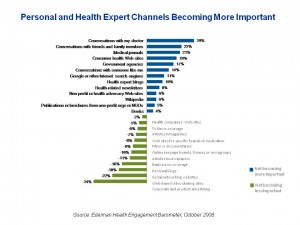 People foresee that, in the future, the most trusted ‘channel’ for their engaging in their health will be…conversations with my doctor. This was found in the 2008 Edelman Health Engagement Barometer survey of health citizens polled in five countries — China, Germany, Russia, the United Kingdom and the United States.
People foresee that, in the future, the most trusted ‘channel’ for their engaging in their health will be…conversations with my doctor. This was found in the 2008 Edelman Health Engagement Barometer survey of health citizens polled in five countries — China, Germany, Russia, the United Kingdom and the United States.
Those health citizens favoring the physician-conversation channel will welcome OpenNotes into their doctor-encounters behind the exam room door. The July 20, 2010, issue of the Annals of Internal Medicine talks about an initiative to, literally, open up doctors’ notes to their patients. As Dr.Tom DelBanco, et. al., attest in the article, “‘open notes’ will spread,” and, over time, “if drafted collaboratively and signed by both doctors and patients, they might evolve to become contracts for care.”
An OpenNotes project is being piloted at three medical centers in Massachusetts, Pennsylvania, and Washington State. 100 primary care doctors will ask patients to review their notes — once safely tucked away in paper or electronic password-protected files. The patients’ notes will be accessible to them through secure web portals.
Health Populi’s Hot Points: The authors call the doctor’s notes, “the hidden core of health records.” What are these seemingly obscure scribblings, anyway? To me, they’re much of the art behind the science of medicine, and the secret sauce of a great diagnostician vs. a mediocre medicine man (or woman). The physician’s notes can include subjective observations, hypotheses of differential diagnoses, and important non-clinical data that helps the best doctor paint a whole picture of the whole person in their exam room.
The dialogue envisioned by the Open Notes effort puts the patient-person right into the center of the transaction. The conversation between “my doctor and me” is what people say they want most in health engagement (as found in the Edelman study), more than pharmaceutical company websites for drugs, TV ads, and Wikipedia for health searches.
![Open Notes Ann_Intern_Med_2010_Jul_153(2)_121-5,_Table[1]](http://www.healthpopuli.com/wp-content/uploads/2010/07/Open-Notes-Ann_Intern_Med_2010_Jul_1532_121-5_Table1-300x224.jpg) There are pro’s and con’s doctors say in this early phase of OpenNotes, listed in the chart. They range from positive perceptions such as improved patient understanding, greater trust between doctor-patient, and improved patient adherence to treatment.
There are pro’s and con’s doctors say in this early phase of OpenNotes, listed in the chart. They range from positive perceptions such as improved patient understanding, greater trust between doctor-patient, and improved patient adherence to treatment.
On the downside, doctors see potential patient confusion due to lack of understanding of medical terminology or abbreviations, increased patient anxiety, and pressure to spend more time explaining the content of the notes.
On balance, the OpenNotes study author-doctors expect, this interaction will culminate in a patient building her own personal clinical story over time. They conclude, “As the patient–doctor relationship moves forward, open notes will almost certainly be on the road ahead.”




 I'm in amazing company here with other #digitalhealth innovators, thinkers and doers. Thank you to Cristian Cortez Fernandez and Zallud for this recognition; I'm grateful.
I'm in amazing company here with other #digitalhealth innovators, thinkers and doers. Thank you to Cristian Cortez Fernandez and Zallud for this recognition; I'm grateful. Jane was named as a member of the AHIP 2024 Advisory Board, joining some valued colleagues to prepare for the challenges and opportunities facing health plans, systems, and other industry stakeholders.
Jane was named as a member of the AHIP 2024 Advisory Board, joining some valued colleagues to prepare for the challenges and opportunities facing health plans, systems, and other industry stakeholders.  Join Jane at AHIP's annual meeting in Las Vegas: I'll be speaking, moderating a panel, and providing thought leadership on health consumers and bolstering equity, empowerment, and self-care.
Join Jane at AHIP's annual meeting in Las Vegas: I'll be speaking, moderating a panel, and providing thought leadership on health consumers and bolstering equity, empowerment, and self-care.